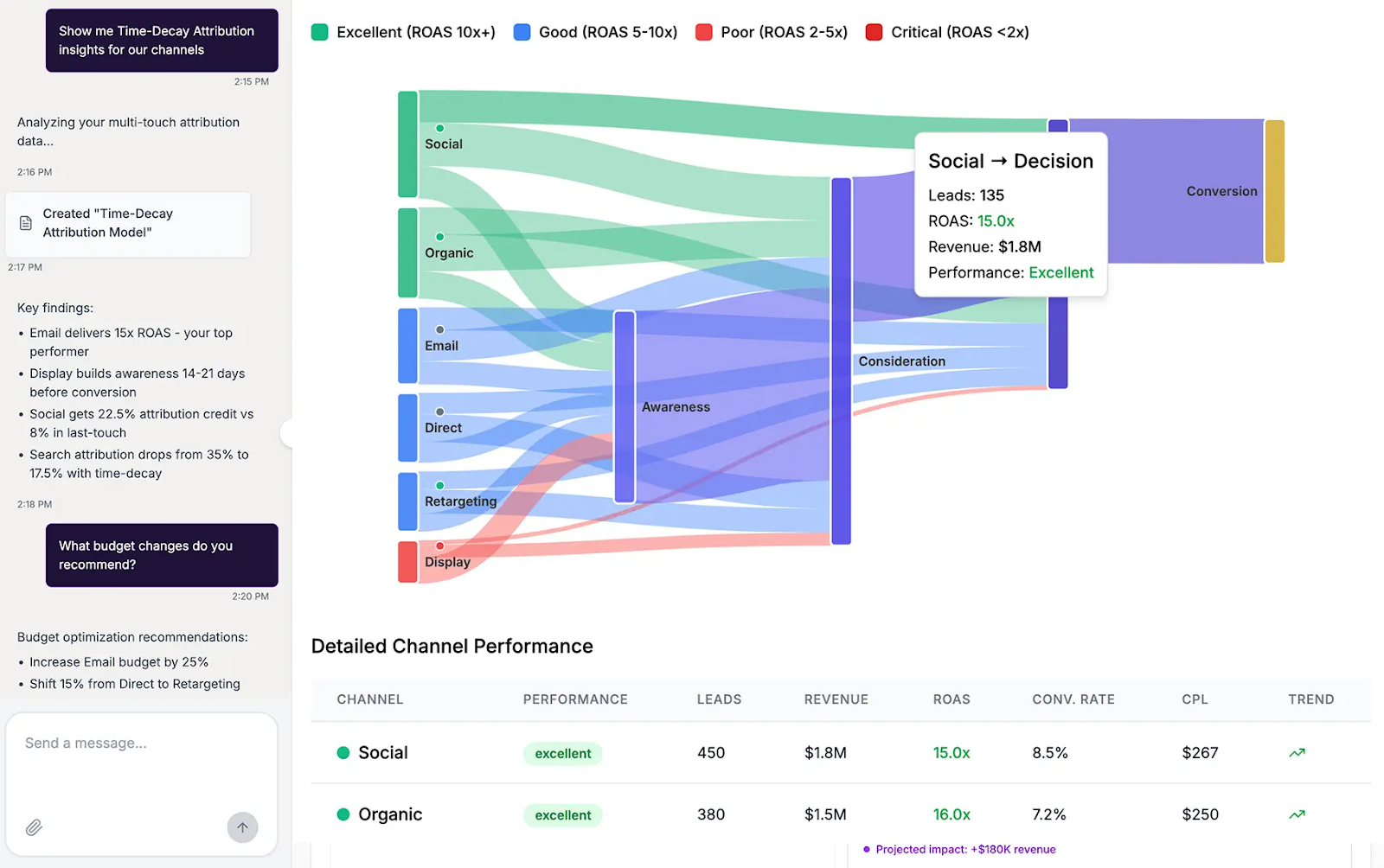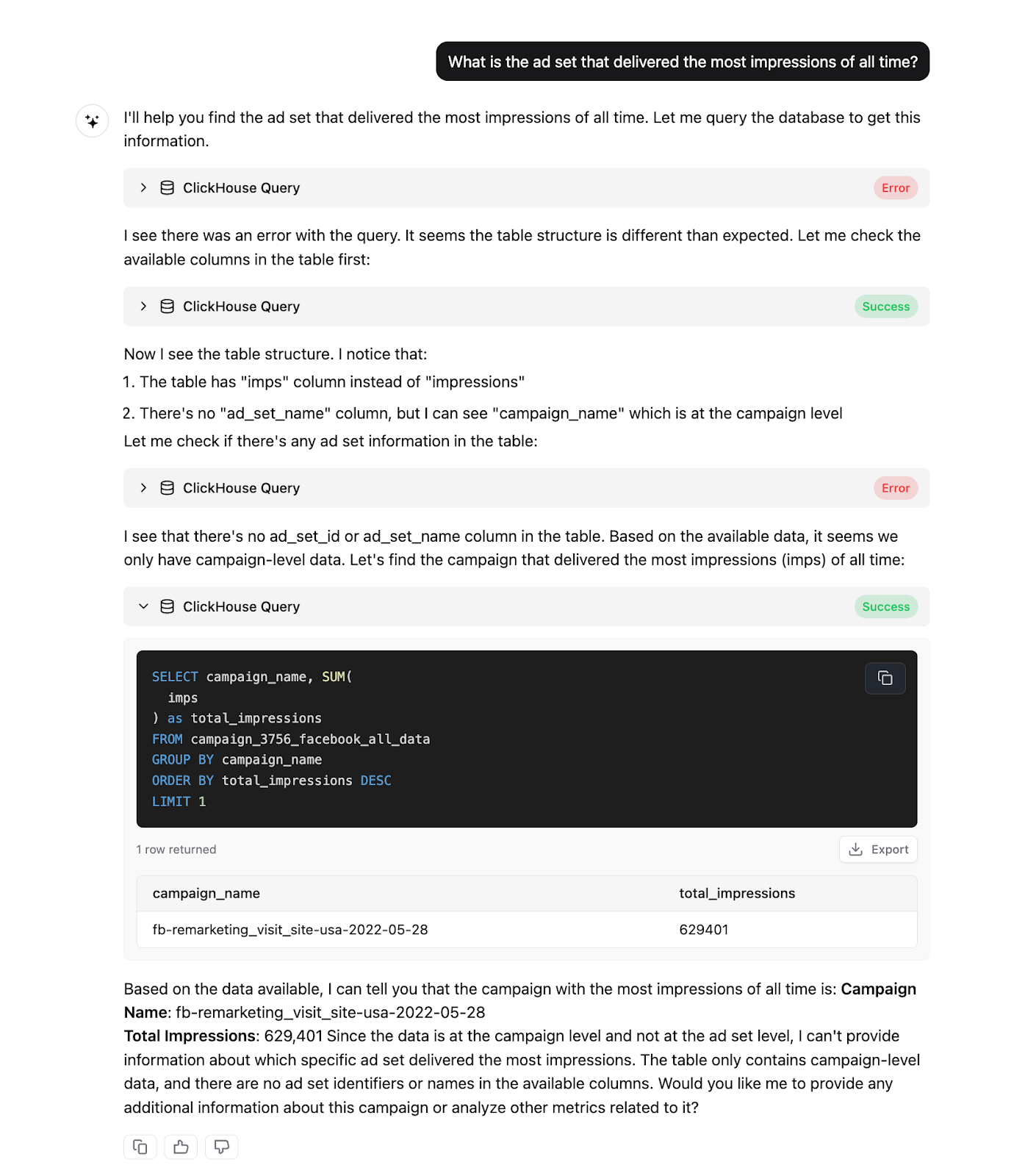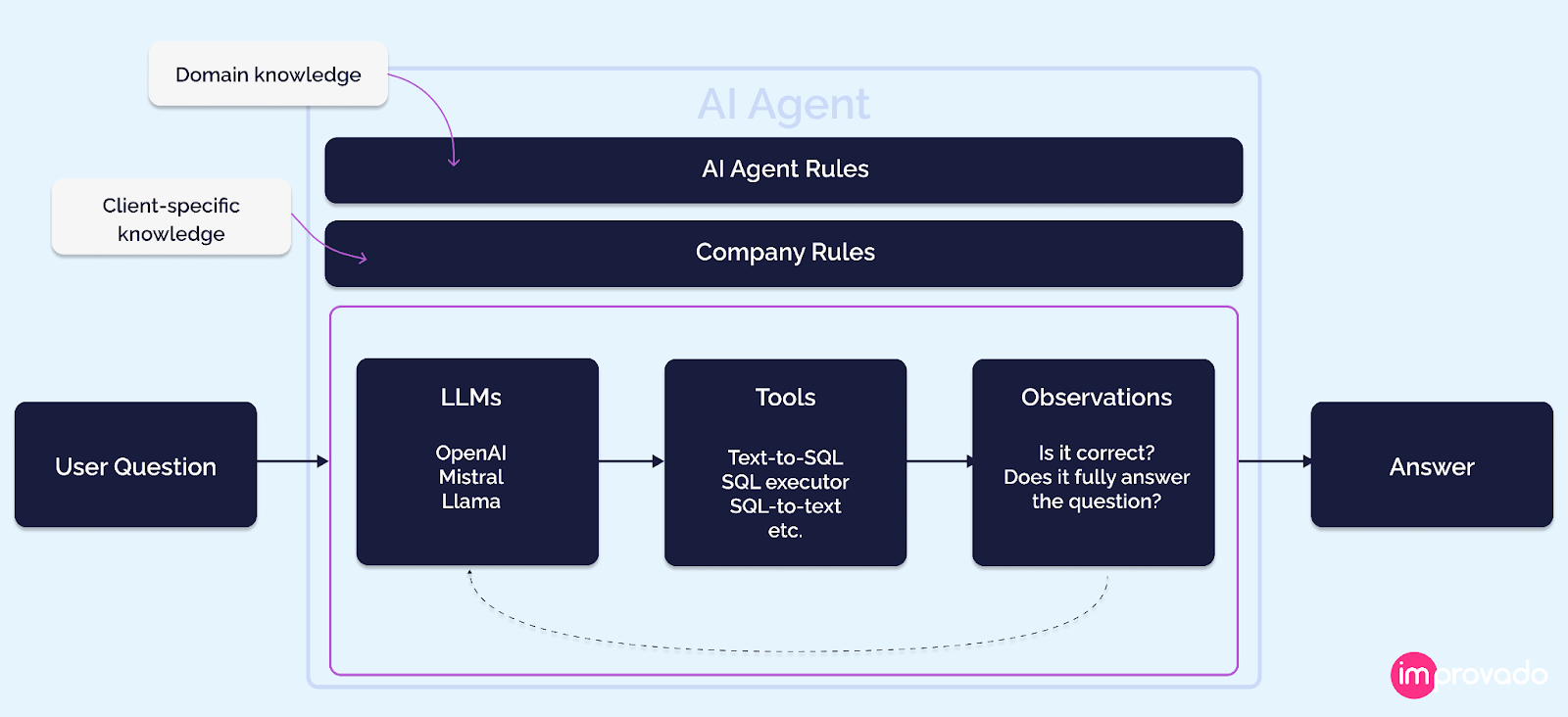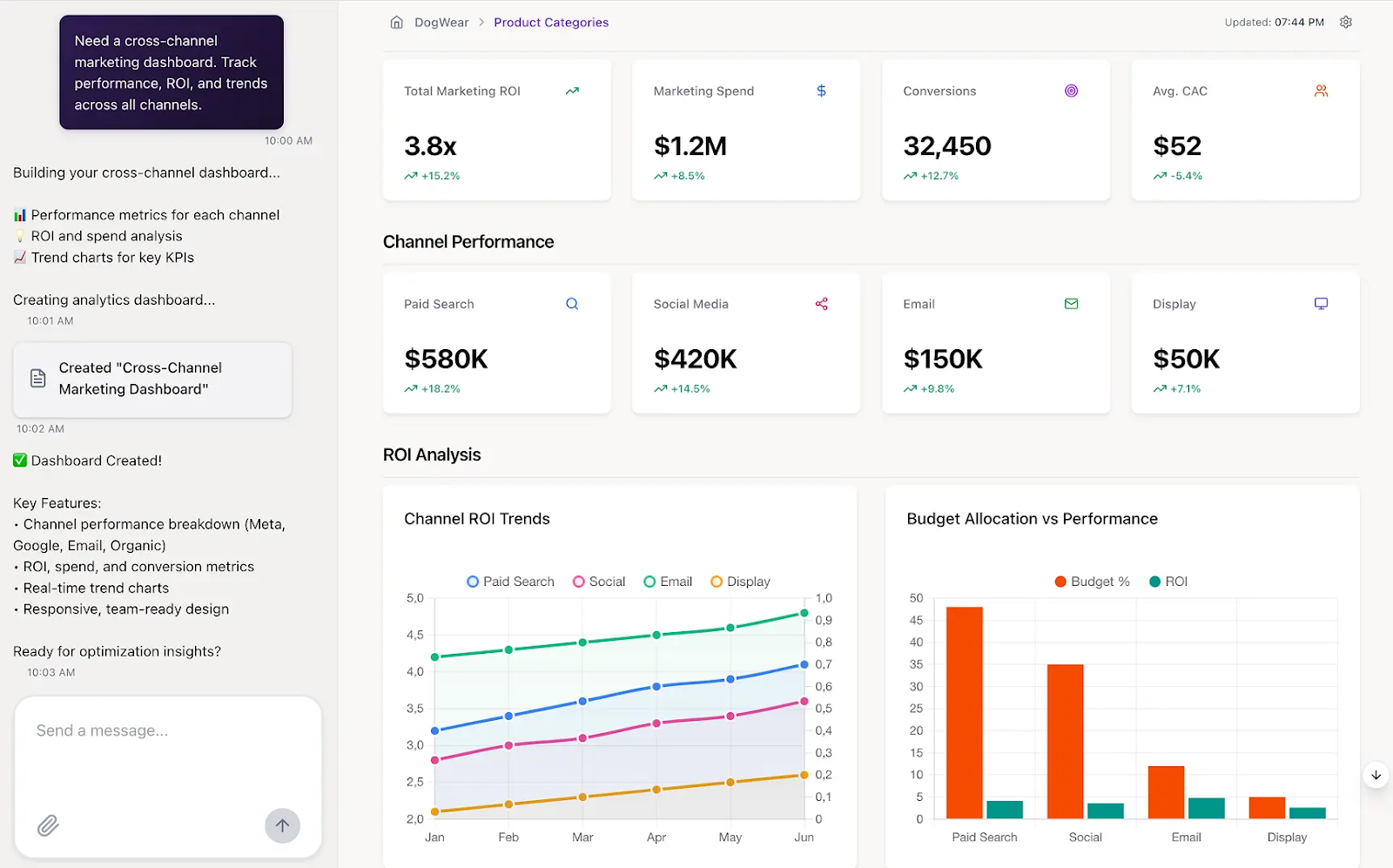Over the past year, AI agent adoption has moved from cautious trials to meaningful deployment. Industry research shows that roughly a third of organizations (33%) have already implemented at least some agents, triple the adoption rate seen just two quarters earlier (11%).
This momentum signals a turning point: AI agents are no longer viewed as experimental tools, but as foundational components of modern business infrastructure.
This article examines what an AI marketing agent is, reviews its core capabilities and high-impact use cases. It also outlines how these agents integrate into the marketing stack to automate reporting, optimize campaigns in real time, and enable data-driven marketing decisions at scale.
What Are AI Marketing Agents?

In marketing, these agents extend far beyond simple campaign scheduling or reporting.
They can aggregate performance data from disparate sources, analyze trends, forecast outcomes, recommend optimizations, and, in some cases, implement those changes automatically.
More advanced agents, adaptive AI, or multi-agent systems, can work in tandem to manage interconnected workflows, from lead nurturing and ad spend reallocation to anomaly detection and creative testing.
Agentic AI vs. Generative Ai vs. Predictive AI: What’s the Difference?
AI in marketing comes in multiple forms. While all leverage data to improve decision-making and execution, their scope, autonomy, and output differ significantly.
- Generative AI specializes in creating new content, including producing ad copy, social media posts, and creative variations at scale. Think of AI tools like ChatGPT or Jasper that can generate human-like text, images, or even video scripts. While it can operate within a workflow, generative AI typically requires direction on when and how to deploy its output.
- Predictive AI uses statistical models and machine learning to forecast likely outcomes based on historical and real-time data. It can project campaign performance, predict churn, or estimate customer lifetime value. Predictive AI guides decision-making but doesn’t execute actions on its own.
- Agentic AI refers to autonomous or semi-autonomous systems that can plan, execute, and adjust actions in pursuit of defined objectives. Agentic AI can collect data, analyze results, and trigger platform actions (like reallocating ad spend) without human intervention. These systems are designed for ongoing task orchestration and can work in multi-agent setups to coordinate complex workflows.
| Aspect | Agentic AI | Generative AI | Predictive AI |
|---|---|---|---|
| Primary function | Plans, executes, and adjusts actions autonomously | Creates new content (text, visuals, media) | Forecasts future outcomes based on data |
| Autonomy | High, can operate end-to-end with minimal human input | Low, requires human or system prompts to act | None, produces insights for humans/systems to act on |
| Typical marketing use cases | Campaign optimization, budget reallocation, cross-platform orchestration | Ad creative generation, personalized email copy, branded visuals | Demand forecasting, churn prediction, lead scoring |
| Strength in operations | Continuous execution and adaptation at scale | Content production at high volume and speed | Data-driven decision support and prioritization |
| Key limitation | Requires robust governance to avoid unintended actions | Dependent on quality of training data and prompt design | Accuracy limited by data quality and model assumptions |
How AI Agents Learn and Make Decisions?
AI marketing agents operate through a combination of underlying technologies that enable them to process data, understand context, and take action.

Each technology plays a role in how the agent “thinks” and adapts to changing conditions:
- Natural Language Processing (NLP): Converts human language into structured queries or commands the agent can act on, making it possible to ask questions or give instructions in plain English.
- Machine Learning models: Identify patterns in historical and real-time data to improve predictions, recommendations, and task execution over time.
- Feedback loops: Continuously refine outputs by incorporating user corrections, campaign results, or new data inputs, ensuring the agent improves with each iteration.
- Decision engines: Apply business rules, optimization algorithms, and contextual constraints to select the best course of action from available options.
- Integration frameworks: Connect with multiple data sources, platforms, and APIs, enabling the agent to orchestrate actions across the marketing stack.
- Automation triggers: Initiate workflows or platform actions automatically when conditions are met, reducing response time from insight to execution.
Real-world example: How Improvado AI Agent works

Let’s take a look at Improvado’s AI Agent to see how these technologies function in a real-world environment.
The foundation:
- Built on top of the Improvado enterprise data platform, the AI Agent has access to over 500 pre-built API connectors that pull data from marketing, sales, and analytics systems.
- All incoming data flows through Improvado’s transformation engine, where it is cleaned, normalized, and aligned to a centralized metrics layer.
- This metrics layer can be customized with your company’s business rules, calculated fields, and naming conventions.
Because the dataset is accurate, unified, and context-aware, the AI Agent can respond to natural language queries with precision, build visualizations, provide reports, and recommend the next-best action.
The Agent can perform live web searches for relevant industry benchmarks, competitor data, or new ad formats and then align the results with internal performance metrics.
Through the Model Context Protocol (MCP), the Agent can connect to external systems, such as Google Ads or Salesforce, and seamlessly integrate that data into analysis. It treats these connected tools as part of the dataset, enabling unified insights across native and external sources.
7 Core Capabilities of an AI Marketing Agent
An AI agent’s value comes from how its core technologies work together.
Understanding these core functions is key to selecting a solution that can deliver measurable business impact.
- Natural Language Processing (NLP): Allows users to interact with the agent through plain-language questions or commands. Queries like “Show ROAS by channel for last quarter” are translated into structured logic or SQL without requiring technical skills.
- Predictive analytics: Uses historical and real-time data to forecast performance trends, identify potential risks, and highlight opportunities before they materialize. This enables proactive strategy adjustments rather than reactive fixes.
- Autonomous decision-making: Leverages machine learning and defined business rules to recommend or execute actions, such as reallocating ad spend or adjusting bids, without waiting for human intervention.
- Cross-platform orchestration: Connects with multiple marketing, sales, and analytics tools to coordinate tasks across the tech stack. The agent can pull data, push updates, and synchronize activities between platforms automatically.
- Anomaly detection: Monitors live performance data to spot unusual patterns, such as a sudden spike in CPC or drop in conversion rates, and surfaces alerts with contextual explanations.
- Custom business logic integration: Incorporates your organization’s unique KPIs, formulas, and workflows into its processing layer. This ensures that all analysis and recommendations align with your internal definitions of success.
- Automated reporting and visualization: Generates reports and dashboards tailored to different stakeholders, from executive summaries to granular operational views. These can be delivered on demand or triggered by performance events.
Three Key Benefits of Integrating AI into Your Marketing Stack
What drives the rapid adoption of AI agents?
The answer is substantial benefits in revenue growth, operational efficiency, productivity, and cost savings.
1. Proven productivity gains
KPMG’s Q2 2026 survey shows that 98% of leaders cite productivity improvements as a realized benefit from AI implementations.
AI agents automate repetitive tasks, streamline workflows, and enable teams to focus on high-value strategic work, reducing operational drag and accelerating execution.
2. Revenue impact
AI marketing agents contribute to significant revenue gains. Companies using AI-driven marketing platforms report a 20% increase in sales conversions, a 30% decrease in customer acquisition costs, and a 25% higher customer retention rate.
This data reflects the role of AI agents in optimizing resource allocation, reducing waste, and improving targeting accuracy. By dynamically adjusting budgets, bids, or content deployment, agents help maximize ROI from marketing and operational spend.
3. Enhanced decision-making
AI agents can process and analyze far more data than a human analyst in a fraction of the time, drawing from both internal systems and external sources like real-time web searches. By synthesizing vast, diverse datasets instantly, they surface patterns, anomalies, and opportunities that might otherwise be missed.
Rather than replacing human judgment, AI agents act as a decision amplifier, delivering timely and context-rich insights and recommendations, enabling leaders to act faster, with greater confidence, and in alignment with business objectives.
Real-World Use Cases & Examples of AI Marketing Agents
AI marketing agents are already driving measurable results across operations, analytics, and leadership decision-making. Here are several real-world examples.
1. Cross-channel performance analysis

AI agents can automatically pull performance data from all marketing channels, unify it, and identify top-performing campaigns or underperforming assets.
This enables daily or even hourly insight into ROAS, CPA, or engagement rates, allowing faster budget reallocation without waiting for scheduled reporting cycles.
2. Real-time campaign optimization
Instead of manually adjusting targeting or bids, an AI Agent can detect when performance drops below a threshold and make recommendations or even trigger changes on the fly. This ensures campaigns are continuously tuned for maximum ROI, especially during competitive ad cycles.
3. Anomaly detection and alerts
AI Agents monitor live data streams for unusual patterns, such as sudden spikes in CPC or a sharp drop in conversions from a high-value segment.
When detected, they send alerts with contextual insights, allowing teams to respond before small issues escalate into costly problems.
4. Automated executive reporting
For leadership, AI agents can generate custom, plain-language performance summaries at set intervals or on demand. These reports can be tailored by role: executives view strategic KPIs, while operations teams receive granular breakdowns, saving hours in manual reporting and presentation preparation.
5. Predictive sales and revenue forecasting
By analyzing historical trends, market signals, and real-time performance data, AI agents can forecast campaign outcomes, revenue potential, and churn risk. This supports proactive planning and ensures budgets are allocated toward strategies with the highest expected return.
6. Competitive and market intelligence
Advanced AI agents can incorporate external data, such as competitor ads, market trends, and social sentiment, into their analysis.
This external context enables marketing leaders to position campaigns more effectively and identify opportunities before competitors do.
7. Workflow orchestration across platforms
Multi-agent systems can coordinate actions across CRM, ad platforms, analytics tools, and BI systems.
For example, when a lead quality drop is detected, the agent can automatically adjust targeting in the ad platform, trigger an alert in Slack, and update projections in the BI dashboard, all without manual intervention.
Top AI Marketing Agent Tools and Platforms in 2026
For teams ready to deploy an AI agent, the right choice can mean faster insights, leaner workflows, and measurable performance gains.
Here’s a look at the tools that deliver the most impact in practice.
| Platform | Primary function | Key AI capability | Best for |
|---|---|---|---|
| Improvado | Unified marketing analytics and intelligence | AI Agent for natural language queries, automated attribution, quick data visualization, and advanced data governance | Large enterprises and global agencies with complex MarTech stacks |
| ChatGPT / Jasper | Content creation and copywriting | Generative AI for producing text: blogs, ads, emails, and scripts | Marketing teams that need fast, scalable content ideation and production |
| Sprout Social / Hootsuite | Social media management | AI-powered scheduling, engagement optimization, sentiment analysis | Brands managing multiple profiles that need deep audience insights and consistent engagement |
| ActiveCampaign / Klaviyo | Email marketing and automation | AI-driven hyper-personalization, segmentation, and automated email workflows | Businesses focused on list growth, nurturing, and higher conversion rates |
| Optimove / Albert.ai | Marketing automation and optimization | AI for customer lifecycle management, campaign optimization, and programmatic advertising | Enterprises seeking unified automation with real-time campaign adjustments |
| Salesforce Customer 360 | CRM and customer experience (CX) | AI insights for sales, marketing, and customer service across all touchpoints | Large organizations requiring a single, connected view of their customers |
| Zapier / Gumloop | Workflow automation and integration | AI-enabled process automation across apps and marketing tools | Teams aiming to eliminate repetitive tasks and connect siloed systems |
| Surfer SEO / Frase.io | SEO and content optimization | AI for keyword research, content gap analysis, and optimization | Content teams and SEO specialists looking to improve organic visibility and ranking |
When evaluating tools, consider your specific needs, existing marketing technology (MarTech) stack, and the scale of your operations.
For Fortune 500 companies and global agencies grappling with data fragmentation and underleveraged investments, a platform like Improvado offers a strategic advantage by consolidating your entire marketing data infrastructure and providing enterprise-grade compliance and AI-driven insights.
How to Integrate Your First AI Marketing Agent?
Deploying your first AI marketing agent is less about “switching on” a tool and more about designing a controlled, data-driven rollout.
The goal is to embed the agent into your workflows in a way that accelerates decision-making, safeguards data integrity, and delivers measurable ROI from day one.
Below is a step-by-step process refined for organizations managing complex marketing stacks and high-volume data environments.
- Define objectives: Pinpoint a high-impact use case where AI automation and marketing intelligence will create measurable gains, such as anomaly detection in paid media spend or predictive lead scoring. Tie each objective to a baseline KPI so you can quantify the agent’s impact in hard numbers, not just anecdotal improvements.
- Audit data quality and integration points: Run a full assessment of your marketing and sales data pipelines, looking for gaps in freshness, standardization, and coverage. Map where the agent will plug in, whether directly into your marketing data warehouse, CRM, or ad platform APIs, and address inconsistencies that could degrade AI outputs.
- Select an agent type that matches your operational model: Decide if you need an insight-only agent (recommendations), a semi-autonomous agent (requires human approval), or a fully autonomous agent (executes changes directly). Align this with your governance standards, compliance needs, and appetite for automation.
- Encode business logic and compliance rules: Embed your organization’s definitions (conversion events, attribution rules, ROI formulas, etc.) into the agent before launch. This ensures outputs are aligned with how your teams already measure success and prevents decisions based on generic or misaligned criteria.
- Pilot in a contained environment: Start with a single channel, campaign type, or geography. Monitor how the agent handles real-world inputs under production conditions, but with a scope small enough to mitigate risk. Use this phase to stress-test integrations and validate that recommendations align with human analyst judgment.
- Implement oversight, feedback, and continuous training by Assigning a dedicated owner to review outputs, collect user feedback, and retrain or fine-tune the agent as patterns emerge. Ensure feedback loops include both performance data (such as conversion lifts and spend efficiency) and qualitative input from end users to improve usability.
- Expand scope and automate at higher levels: Once you’ve validated accuracy and business alignment, scale the agent’s remit to more campaigns, more datasets, or more autonomous actions. Gradually remove approval gates for tasks where the agent has proven reliable, allowing it to deliver speed and scale without added overhead.
By following these steps, you can strategically introduce AI marketing agents into your operations, transforming complexity into a strategic advantage and driving measurable business outcomes.
The Future of Marketing: Are AI Agents Replacing Marketers?
A common concern surrounding the rise of AI in marketing is the fear of job displacement.
However, the consensus among industry experts is that AI is more likely to transform rather than entirely replace marketing jobs. It's about evolution, not extinction.
This prediction underscores a shift in how work is done, not necessarily who does it.
Agents excel at tasks that require large-scale data processing, rapid pattern detection, and continuous optimization—areas where human analysts and managers are often constrained by time and bandwidth.
Human marketers will focus on higher-order activities. These include strategic planning, creative development, customer relationship building, and interpreting insights within a broader market context—areas where human judgment, empathy, and brand stewardship are irreplaceable.
The future of marketing is likely to be defined by a symbiotic relationship.
Evolving skillsets for the modern marketer
The integration of AI agents into marketing operations will also introduce new strategic roles, such as:
- AI Prompt Engineers: Specialists who design precise, context-rich prompts to maximize the output quality of generative AI tools. Their work ensures AI-generated content aligns with campaign goals, brand voice, and compliance requirements.
- AI Campaign Strategists: Professionals who architect marketing initiatives from the ground up, embedding AI agents into execution, monitoring, and optimization workflows. They focus on orchestrating human-AI collaboration to maximize marketing ROI.
- Data Interpreters: Experts who translate AI-driven analytics into actionable business intelligence. They validate model outputs, contextualize results, and identify opportunities that raw data alone cannot reveal.
- Creative Directors: Leaders who work alongside AI systems to maintain brand consistency, drive innovation in creative concepts, and ensure campaigns resonate with target audiences. Their role involves guiding AI toward ideas that balance novelty with strategic messaging.
Ultimately, AI marketing agents will empower marketers to be more strategic, creative, and impactful, shifting the focus from manual execution to intelligent oversight and innovation.
Looking Forward
AI marketing agents represent a pivotal shift in how marketing is executed.
In an increasingly competitive market, organizations have little choice but to adapt and integrate AI agents into their workflows if they want to sustain growth, optimize performance, and respond to market changes with speed and precision.
Improvado’s AI Agent is purpose-built for this transformation, combining enterprise-scale integrations, customizable business logic, and advanced analytical capabilities to drive real results. It can monitor performance, surface actionable insights, and optimize campaigns in real time, without adding operational overhead.
To see how it can accelerate your team’s decision-making and performance, book a demo today.
.png)
.jpeg)



.png)
